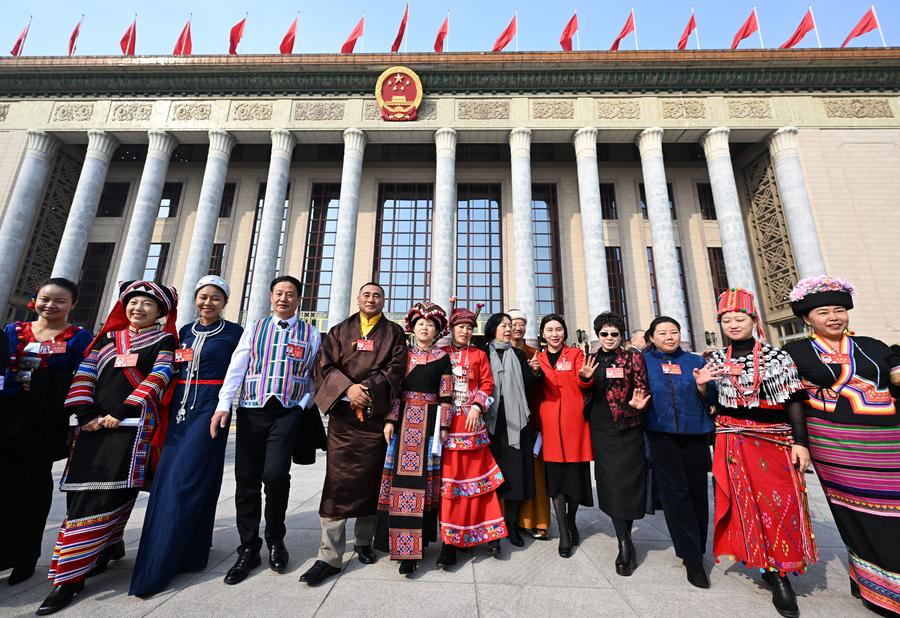► « Whole-process people’s democracy is the defining feature of socialist democracy, » said Chinese President Xi Jinping. « It is democracy in its broadest, most genuine, and most effective form. »
► The thoughts and aspirations of over 1.4 billion people have been incorporated into the top-level design of national development through China’s unique and distinctive whole-process people’s democracy.
► The « two sessions » offer the world an important window to observe China’s democracy.
Seated in the Great Hall of the People in Beijing, Chinese national lawmaker Wang Yongcheng ran his fingers along raised dots of the Braille government work report as he listened to the document delivered by the premier.
Wang, who is visually impaired, was reviewing the report during the annual session of China’s people’s congress, which together with the political advisory body meeting is known as « two sessions. » For this year’s session, he submitted suggestions regarding retirement services for the disabled people.
The « two sessions » offer the world an important window to observe China’s democracy. Thousands of deputies to the National People’s Congress (NPC) and members of the National Committee of the Chinese People’s Political Consultative Conference (CPPCC) gathered in Beijing to discuss and plan for future development.
In a country with about one-fifth of the world’s population, people are actively participating in democratic practices, ranging from state legislation to local matters.
Scenarios of democracy manifest in diverse ways. In tea lounges in east China’s Fujian Province, people engage with lawmakers, expressing their opinions and contributing to decision-making processes. In another instance, thanks to a political advisor’s diligent investigation, more than 230,000 ancient trees in central China’s Hunan Province were granted legal protection.
« Whole-process people’s democracy is the defining feature of socialist democracy, » said Chinese President Xi Jinping. « It is democracy in its broadest, most genuine, and most effective form. »
The thoughts and aspirations of over 1.4 billion people have been incorporated into the top-level design of national development through China’s unique and distinctive whole-process people’s democracy.
BROADEST REPRESENTATION
Wang Yongcheng, 57, is the first visually impaired deputy to the NPC since the establishment of the People’s Republic of China 75 years ago. Fulfilling his duties as a national lawmaker since last year, Wang has been approached by many visually impaired people requesting him to voice their concerns.
Last year, Wang submitted four suggestions, one of which suggested publishing textbooks with large font sizes for low-vision students attending regular classes. He received Braille responses to the suggestions from the relevant government departments. « The blind community is ‘seen’ by more people, » Wang said.
Mandated with state power by the Constitution, NPC deputies include Chinese leaders, entrepreneurs, scientists and university presidents as well as couriers, farmers and welders, etc.
As the fundamental political system in China, the people’s congress system entails that individuals can be elected as NPC deputies regardless of ethnic group, occupation, gender, or financial status. At no point has the « democracy for the few, » as seen in some countries — « democracy of the 1 percent, by the 1 percent, for the 1 percent » — been seen in China.
In 1954, the people’s congress system was officially established in China. Over the past 70 years, democracy in China has become even more vigorous.
By last year, China had over 2.77 million deputies to people’s congresses at all levels nationwide. Every ethnic group in the country has its own deputies to the NPC and members of the CPPCC National Committee.
Liu Lei, a 40-year-old NPC deputy, has been championing the cause of the Hezhe ethnic group, which boasts a population of over 5,000 in China and mostly resides in the northernmost province of Heilongjiang.
This ethnic group previously relied on fishing and hunting but has now transitioned to selling traditional Hezhe fish-skin paintings on e-commerce platforms. During this year’s « two sessions, » Liu called for increasing support for industries in remote regions to provide better development opportunities for the group.
In Western countries such as the United States, it is rare to see a high representation of rural people, blue-collar workers and ethnic minority individuals at the highest level of state power, said columnist Iara Vidal of the Brazilian magazine Revista Forum, adding that diverse voices are heard and respected in China’s annual « two sessions. »
CHINESE DEMOCRACY NOT A SHOW
In the ancient town of Wufu, Liu Jizhang, a deputy to the municipal people’s congress of Nanping in Fujian, regularly gathers suggestions from neighborhood residents. Following suggestions to improve the local landscape, flowers were promptly planted along footpaths.
« I push for immediate action on matters I can address. For those requiring further coordination, I direct them to relevant authorities and follow through, » Liu said.
The town is well-acquainted with China’s ancient people-centered philosophy. Confucian scholar Zhu Xi from the Southern Song Dynasty (1127-1279) lived and studied in Wufu for many years. He championed the philosophy that a nation is based on its people, and society is established for the benefit of its people.
The Communist Party of China (CPC) has elevated the people-oriented philosophy to the core principle of « putting the people at the center » in national governance.
Liu Ting, an NPC deputy, has been focusing on issues related to an aging society over the past years. He has traveled to over 20 cities in China to explore how to use intelligent services to serve the aged population.
The environment and resource sector of the CPPCC National Committee, established last year, put forth over 160 proposals in 2023. Huang Miansong, a political advisor of this sector, surveyed multiple places focusing on rural development, and suggested orderly construction of rural environmental facilities during this year’s session.
China has fostered a democratic framework that ensures the orderly and effective participation of its people in political affairs.
Venues and channels for consultation and discussion are available in various forms within neighborhoods. Online platforms ranging from forums to polls and surveys empower the people to contribute to policy discussions and the decision-making process.
At a legislation outreach in Shanghai’s Hongqiao Subdistrict, boards are used to display the number of legislative discussions, but numbers are marked with magnets so they can be replaced easily, said Sheng Hong, an NPC deputy and a local community Party official. Over the past six months, nearly 100 suggestions submitted from the outreach have been adopted in national legislation including China’s charity law and law on barrier-free environment creation.
Across the nation, the Legislative Affairs Commission of the NPC Standing Committee has established 45 such grassroots outreaches. Provincial and municipal legislative commissions have also set up over 6,500 grassroots outreaches across China, ensuring that the voices of the people are heard.
Simon Lichtenberg, a Danish entrepreneur who has lived in Shanghai for over three decades, has participated in multiple legislative consultations. He said that improving the laws by making suggestions gives people a sense of fulfillment and achievement.
Chinese democracy is not a formality, nor a « one-time » show. Deputies to various levels of people’s congresses are accountable to the public.
When taking a barrage of questions from voters several months ago, Wang Lihong, a deputy to a district congress in Chengdu, capital of Sichuan Province, was sweating in the palms of his hands even in winter chill.
In response to the problem of chaotic parking in the community, he promised to run it over with the property management and seek solutions. That day, among the 100 voters who participated in the evaluation, 99 expressed satisfaction with his performance.
Carlos Martinez, a British author and political commentator, believes that in the Chinese system, the people always enjoy democratic rights in all stages, not just during elections.
DRIVING MODERNIZATION
During a trip to the countryside in Hunan Province, Lai Mingyong, a member of the CPPCC National Committee, found an ancient tree pummeled with iron nails serving as hangers for various items. Feeling the need to protect ages-old trees, Lai promptly submitted a proposal through the CPPCC Hunan Provincial Committee online platform.
Not long after, relevant trial schemes followed by regulations for ancient and renowned tree protection were implemented. Damaging such trees could now incur fines of up to 5,000 yuan (about 705 U.S. dollars).
« Chinese democracy has never been an ornament, » Lai said.
Chinese people believe that the efficacy of democracy holds greater significance than its form. In China, democracy aims at pooling of wisdom to promote growth and prosperity.
At the « two sessions » in 2019, Dong Caiyun, an NPC deputy from the rural area of Jishishan County, highlighted the need for a local highway linking surrounding areas. Her voice was well heard.
Construction of a highway began later that year after the discussions. When a 6.2-magnitude earthquake struck Jishishan last December, the road that had just opened to traffic emerged as a lifeline linking the affected regions, facilitating the transportation of rescue forces and supplies.
During the « two sessions » last year, all proposals and suggestions submitted by NPC deputies were later reviewed, processed and given replies.
Every year, the government work report undergoes thorough deliberation by deputies before approval at the NPC annual session. Subsequently, the State Council will specify key tasks based on the report, assign responsibilities and establish deadlines for implementation.
Jose Luis Centella, president of the Communist Party of Spain, said that China has always fostered a democracy that sees wide participation from the people, involving them in national governance.
Democracy serves as a solid foundation for China’s governance. A survey report released last year by the Academy of Contemporary China and World Studies revealed that respondents from 23 countries expressed an average approval rating of nearly 90 percent for China’s governance capabilities.
The report to the 20th CPC National Congress emphasized that developing a whole-process people’s democracy is one of the essential requirements of Chinese modernization.
« When Chinese modernization offers a new option for human modernization, its unique perspective on democracy also becomes a new form of democracy, » said Zhou Hanmin, a member of the Standing Committee of the National Committee of the CPPCC and president of the Shanghai Public Diplomacy Association. « This is a significant contribution of China to the political civilization of humanity. »
(Video reporters: Wu Yao, Feng Guorui, Xie Han, Hong Ling, Zhou Yang, Deng Min, James Asande, Duncan, Sun Nan and Ji Ben; Video editors: Zhang Li, Hui Peipei, Li Qin and Liu Yutian)■
By Xinhua




